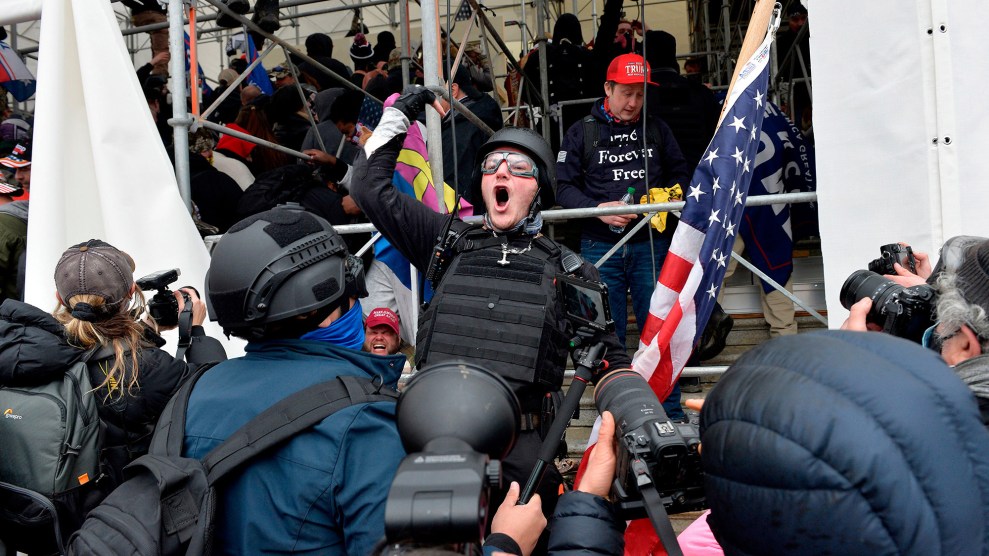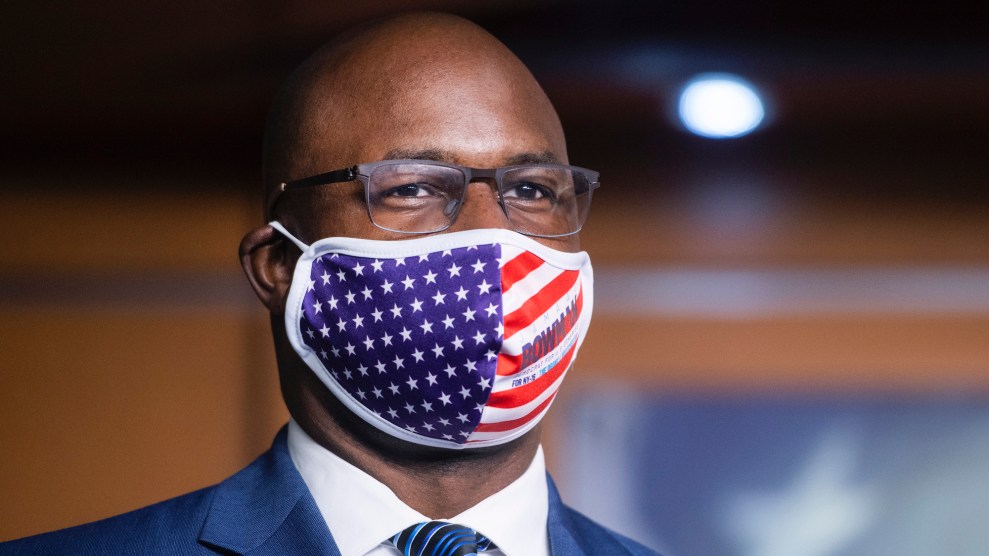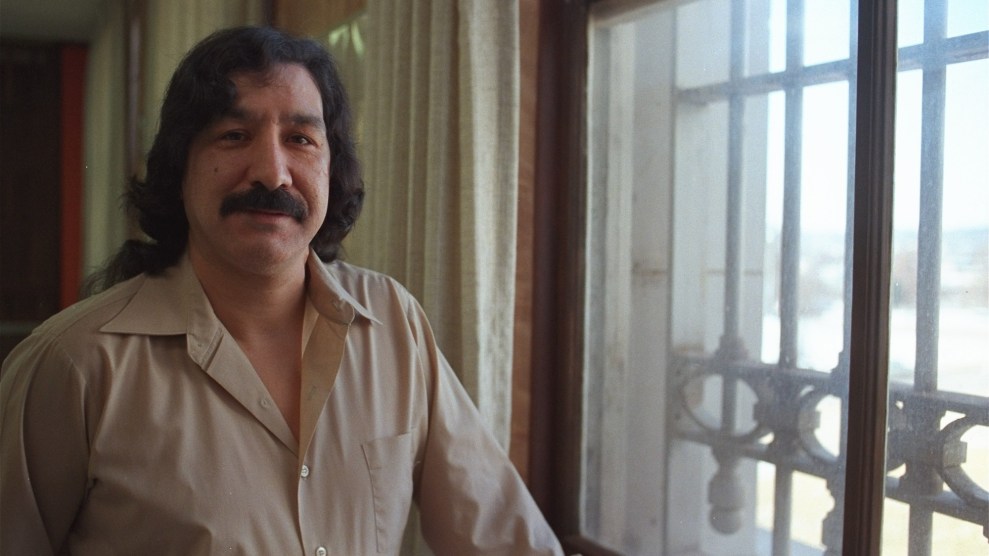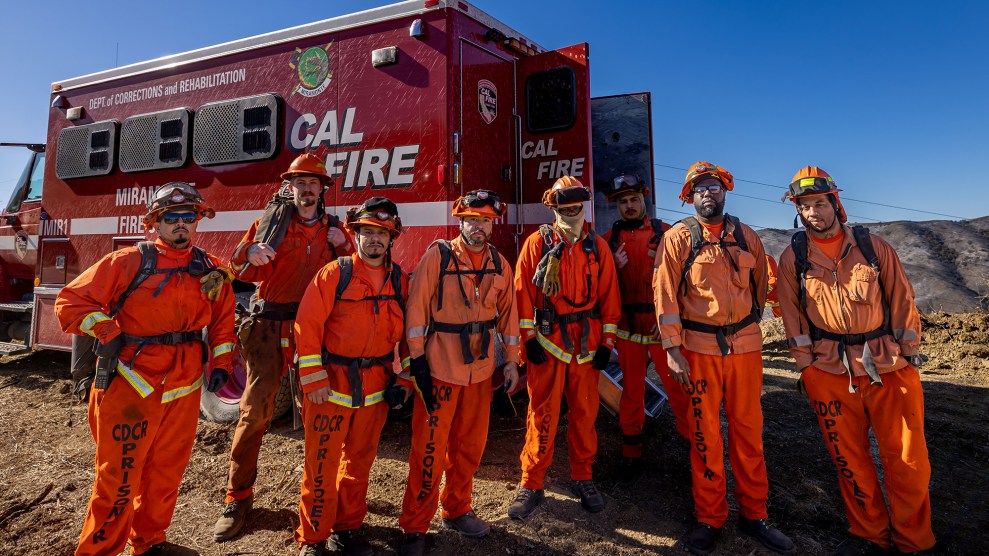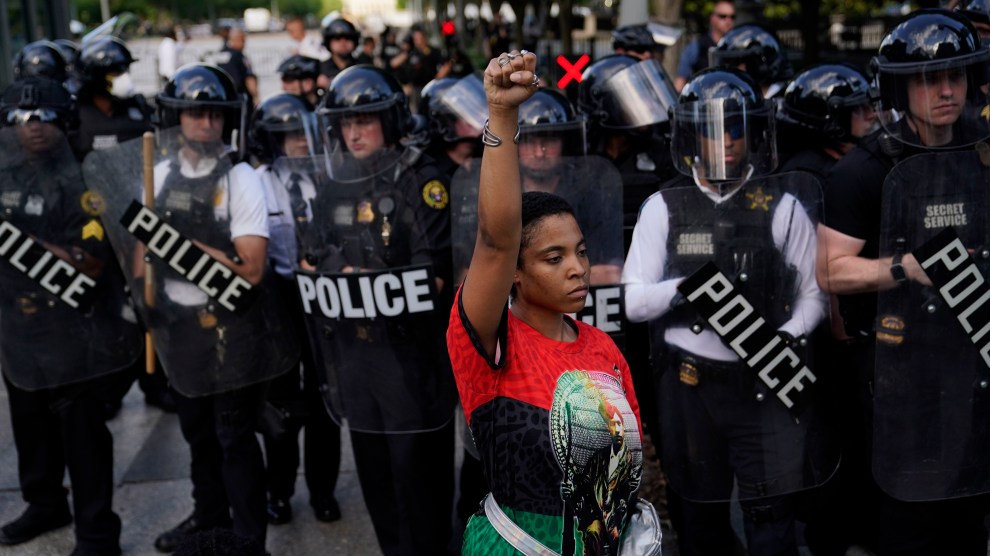
A demonstrator near the White House raises a fist in May 2020 as others gather to protest the death of George Floyd by a white police officer in Minneapolis.Evan Vucci, File/AP
One Capitol Police officer was caught taking a selfie with a member of the white supremacist mob that overtook the US Capitol last week. A second officer has been suspended for wearing a “Make America Great Again” hat and directing insurrectionists around the building rather than handcuffing them. The storming of the Capitol has revived concerns about the ties between police and white supremacists, in part because officers arrested far more Black Lives Matter protesters this summer than they did Trump supporters who broke into the legislative building with weapons, at least one Confederate flag, and bundles of zip ties.
It wasn’t just on-duty cops who raised eyebrows: Off-duty law enforcement officers were allegedly part of the mob itself, with some flashing their badges and identification cards as they rushed through the doors, according to an on-duty DC Metro Police officer who saw them. “If these people can storm the Capitol building with no regard to punishment, you have to wonder how much they abuse their powers when they put on their uniforms,” the officer wrote later on Facebook, according to Politico.
Police departments around the country are now investigating officers who are suspected of attending the rally in DC, or were caught posting racist messages on social media. Days after the attack, New York Rep. Jamaal Bowman introduced a bill that would require a commission to examine whether Capitol Police officers have white supremacist ties.
For some experts, these investigations are far too little, too late: Police departments and federal agencies have long understood that certain cops are connected to racist groups, and have largely looked the other way. “We’ve known for decades that there are racial disparities in every step of the criminal justice process, from who gets stopped to who gets arrested to who police use force against to how they get charged,” says Michael German, a former FBI agent who now studies white supremacist infiltration of police departments as a fellow at the liberal Brennan Center for Justice, a think tank. “It’s treated as implicit bias or structural bias without an acknowledgment that there’s a lot of explicit bias driving these disparities.”
As an FBI agent in the 1990s, German went undercover with white supremacist and militia groups to thwart their bomb plots. At the time, the Justice Department warned him to be careful about sharing details of his investigations with cops, because some of them had ties to white supremacist groups themselves. Even so, in the decades since then, he says the FBI has not prioritized investigating those police officers and getting them off the streets, allowing them to continue their jobs. I caught up with German this week to ask how law enforcement agencies have fallen short in identifying and firing racist officers, and what they should be doing now, in the wake of the Capitol siege, to root them out.
Do we know roughly how many cops have ties to white supremacists?
Unfortunately we don’t have a sense of the scope of the problem because no entity has made it their mission to identify the scope. But the FBI regularly warns its agents who are investigating white supremacists and far-right militants that the subjects of those investigations will often have active links to law enforcement, and that they need to alter their methodology to protect the integrity of their investigations. Those were warnings I received in the 1990s when I worked these cases, and they appear in published leaked FBI materials, including the 2015 counterterrorism policy guide.
When you say FBI agents alter their methodologies, do you mean they’re not supposed to collaborate as much with police while investigating white supremacists?
Exactly. The counterterrorism policy guide recommends that the FBI put the subjects of these investigations on a watch list with what’s called the silent-hit function; if a police officer pulls over the subject of your investigation, a silent-hit function would not tell the officer that he’s interacting with someone who’s the subject of a terrorism investigation.
If the FBI knows this is a problem of such significance that it has to alter its methodologies of investigating cases, I would argue it also has to have a strategy to protect the public from these white supremacists and far-right militants who carry a badge. The fact that they don’t even document who these police officers are shows an inexcusable lack of attention to their mission to enforce the civil rights laws of this country as well as the counterterrorism laws.
In 2006, the FBI warned that for decades, white supremacist groups had been attempting to “recruit” police officers. Can you talk about the history of this?
It’s important to understand that the United States was founded as a white supremacist nation, so our laws enforced white supremacy, so those who were sworn to enforce the law were enforcing white supremacy. After slavery ended, you had Jim Crow. After the civil rights era, you still had sundown towns, where the police enforced unwritten rules about who could stay in town past dark. To imagine there was somehow a miraculous event that cured the police of that problem is foolish.
The most egregious are examples where police officers were actually members of white supremacist groups and would go to public events representing themselves as police officers. And their membership was known to law enforcement for years and unaddressed, and it was only when the public learned about it that the police department took action.
We do so little examination of police violence in this country, but we know it disproportionately targets people who are Black or brown. How much of that is driven from actual white supremacist ideology rather than isolated incidents that happen on the job is something the Justice Department has a responsibility to investigate.
What kind of recruitment techniques do white supremacist groups use with police?
Having spent time as an FBI undercover agent, I think the term [“recruit”] doesn’t accurately describe what’s happening. It’s not so much that this group will put a pamphlet together and make a recruiting pitch and approach officers. In many cases, these are people who grew up affiliating with white supremacists. One guy went to work as a prison guard, one guy went to work in factories, and the other guy went to work as a police officer. And they are just carrying on attitudes and associating with the same people they associated with when they weren’t a police officer.
Are there any police departments that have tried themselves to root out racist cops, and any that did a good job?
Police departments tend to be reactive to public outrage. Part of the problem is that most law enforcement agencies don’t have written policies specifically addressing the issue. So when the public identifies somebody who’s operating in league with a white supremacist group or far-right militant group, they end up disciplining them under broad prohibitions against engaging in public conduct detrimental to the public interest, or similarly worded policies.
Sometimes this doesn’t stand up to the due process scrutiny that’s designed to protect innocent officers from being treating unfairly. So they end up getting their jobs back after they’re fired.
What I argue is that even where the conduct is not sufficient to terminate that officer, the police department still has an obligation to mitigate the threat they pose to the community. There are plenty of jobs in police departments that don’t regularly interact with the public. Or perhaps some extra level of supervision of that officer would be warranted.
What’s the main legal barrier to firing them? Police union contracts?
Right. Or just the lack of policy, or disparate treatment, where other officers known to engage in racist behavior weren’t fired in the past, so it’s unfair to fire this officer. Often, if the police department knew about your involvement with this white supremacist group for five years but is now trying to fire you, you can argue: “I’m not being fired because of the conduct, because the department knew about the conduct; I’m being fired because the public demanded it, and that’s not appropriate.” That’s the problem with the way we have just turned a blind eye to this problem for so many decades.
Is there anything else that government can do to address this problem?
What we need is to empower prosecutors and defense attorneys. When these [white supremacist] officers are identified by the agency or by the public, that information should be provided to prosecutors and they [the officer] should be put on no-call lists or Brady lists. Today these no-call lists are lists of officers who are known to have previously engaged in some kind of dishonest conduct that a defense attorney could use to impeach their testimony. My argument is that racist behavior is one of those categories that should be available to the defense attorney. [This can] force those agents off the street.
In an ideal world, what do you think the Justice Department or FBI’s role would be in rooting out white supremacist police officers?
What I would recommend is for the Justice Department to implement a national strategy to identify these officers, document the scope of the threat, and design programs to mitigate it. It’s a matter of priorities. If the FBI heard through the grapevine that a police officer was affiliating himself with Al Qaeda or ISIS, we can be confident the FBI would react quickly. They should act just as quickly when the police officer is associated with white supremacist and far-right militant groups.
Some people have expressed the idea that we need to create a list of designated domestic terrorist groups, but that’s a silly approach because these groups change their names regularly. In other words, writing a list of groups that are banned is not going to help. Because officers can look at the list and say, “Okay, I won’t join this group, but I’ll join this other group. Or I’ll be part of a group that previously called itself the KKK but now calls itself something else.” But it’s the same people engaged in the same racist conduct. It takes an understanding of how these groups actually organize before you can write a policy.
The officers and agents within these federal, state, and local law enforcement departments know who the racists are among them. What we need to do is make sure officers who see racist misconduct or far-right militancy within law enforcement are protected when they report it. We need to strengthen whistleblower protection laws.
You wrote in a recent report about a man in Anniston, Alabama, who applied to be a police officer, and listed on his application that he was part of the League of the South, a white supremacist secessionist group. He was hired anyway. Are cops’ racist ties often that obvious?
Yes, often it is that obvious. So it’s not that they can’t be seen, it’s that nobody is looking for them.
Update (January 15): The Capitol Police officer who wore a MAGA hat claims he put on the cap as part of a plan to save some of his colleagues who were in danger, according to a new Wall Street Journal report.

